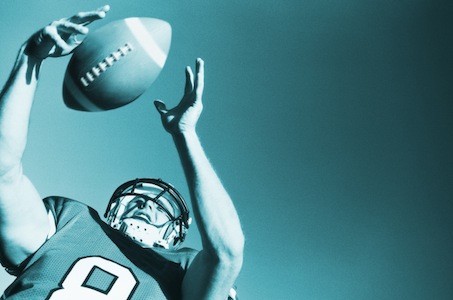Despite her unwavering commitment to feminism, Tina Rodia still loves the sport that is the ultimate display of male aggression.
This Sunday, as two NFL teams play the last game of football season to determine the ultimate victor, I will spend most of the time reflecting on the surprising conundrum that professional football has introduced to my life.
I am a proud and dedicated feminist, and I have reluctantly given myself over to new-found football fandom. The conundrum I face is the inability to square my traditional feminist convictions with a sport that incorporates aggression and violence into its very playbook, and a questionably sexist culture in team and personal players’ behavior.
The sport is an awe-inspiring display of physicality, precision, strategy, endurance, and teamwork. However, up to five years ago, football eluded me at best, brought moments of extreme derision at worst. When I began a relationship with a Green Bay Packers fan from Wisconsin four years ago, I was shocked to learn that the game has the power to intrigue and compel even me.
The physicality involved in football is nuanced and studied, but to the non-initiated, it resembles brute bullying. Critics of the sport have focused recently on the disturbing cases of former football players who commit suicide, blaming the anguish of brain trauma from sustaining multiple concussions. In 2011, former NFL player Dave Duerson committed suicide with a shotgun aimed deliberately at his chest and instructions for his family to have his brain matter studied for CTE (chronic traumatic encephalopathy) research. One year later, former NFL linebacker Junior Seau, also committed suicide with a shotgun aimed at his chest. After his family donated his brain tissue to research, the National Institutes of Health found evidence of CTE. This is an enormously uncomfortable topic that the NFL addresses with equipment technology and a reticence to address the brute force that is, in essence, the nature of the game.
It is hard to square an appreciation for this sport with its critics, when critics cite the brutality, aggression, and spotty off-field behavior of the players as their reason to hate the sport. This criticism cannot be denied. It is harder to convince critics that I recognize just how gruesome and unsettling the sport and the players can be, yet am still swayed by its strategy and execution. I probably recognize the cringe-worthy details of the game and its players more than a lot of naysayers.
But oh, how compelling the sport is. The skill and mastery of a good quarterback is one example of humanity at its best. And football requires not just individual perfection among its athletes, but teamwork in the highest order. A good quarterback is ineffective if a perfectly trained, toned, and skilled receiver does not catch his calculated pass. How can anyone not love this display of speed, accuracy, strength, and strategy?
Admittedly, there’s a lot not to love about the football players themselves.
This Sunday, Baltimore Ravens linebacker Ray Lewis will end the season and his career at the Super Bowl. Lewis’s career as a football player has been much celebrated and admired. His life off-field is much harder to admire. In 2000, murder and aggravated assault charges were pressed on Lewis. His lawyer successfully negotiated a plea agreement in exchange for witness testimony, and his original guilty plea was applied to a misdemeanor charge of obstruction of justice.
Murder charges are an extreme example of NFL player behavior, yet Philadelphia Eagles quarterback Michael Vick’s dog-fighting ring, of which he was found guilty, is unforgivable. Similarly disturbing is the “Love Boat scandal,” an alleged tangle of indecent, disorderly, and illegal conduct among seventeen Minnesota Vikings players and hired prostitutes on two houseboats in 2005. It is arguable, however, that sex scandals and prostitutes don’t surprise us when it comes to the hyper-masculinity of the NFL.
The football-averse can easily dislike football culture: It involves brutality, injury, and aggression, its corporate sponsors include beer, trucks, and fast food. While exceptions to the standard demographic do abound (hello!), it’s a pretty hard sell.
After all, the nature of the game celebrates extreme physical toughness and strength working directly against the bodies of their opponents. This is arguably the case for every sport, but most athletes (wrestling and boxing aside) do not hurl their bodies directly at their opponents. Football takes aggression and amplifies it onto the body of another human being. For some, this is sport. To many others, this is violence.
All the poor behavior off the field aside, even the most spotless reputation of the most beloved football player is couched directly in male aggression. It is how the game is played, and won. And yet, despite my unwavering commitment to feminism, and to condemning men for violent behavior, somehow this sport has won me over.
Tina Rodia is a freelance writer and small business owner in San Francisco. She grew up in Connecticut, and has a B.A. in creative writing and women’s studies.
Related Links:

